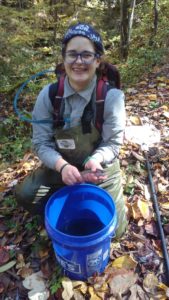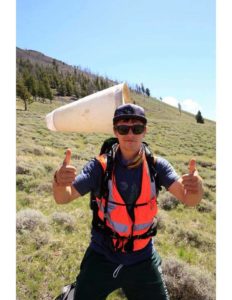SUPER Research Reflects Strength and Breadth of Ecological Research
April 16, 2019
by Laura van der Pol
Do you know how to design an effective Citizen Science campaign to assess pollinator habitat? Or the best way to measure snow surface roughness? These are just a couple of the valuable undergraduate research studies SUPER students are leading this year.
SUPER Program

There are many paths to becoming a researcher, but for many, the journey begins during undergraduate studies. The SUPER program, Skills for Undergraduate Participation in Ecological Research in the Department of Ecosystem Science and Sustainability, is a year-long undergraduate research opportunity led by Stacy Lynn, a Natural Resource Ecology Laboratoryresearch scientist.
SUPER trains undergraduate students in fundamental ecological research skills, and pairs students with research mentors to conduct a literature review and research project. The program began in 2010 when NREL graduate students recognized the need and the capacity of NREL scientists and graduate students to mentor undergraduates. It bridges the NREL’s research excellence and academic mission of ESS to train future scientists to address challenges of social-ecological sustainability through a hybrid engaged-classroom-meets-research-project approach.
SUPER students and mentors are showing off their work at 2019’s CSU’s University-wide CURC (Celebrate Undergraduate Research and Creativity) Showcase on April 15 and the ESS Undergraduate Research Symposium on April 18, 9 a.m.-12 p.m. in the Lory Student Center Ballrooms C & D.
Wide array of undergraduate research
This year’s diverse set of student projects reflects the breadth of research carried out in the Warner College of Natural Resources. Topics ranging from social sciences, microbiology, soil and plant chemistry, wildlife behavior, and learning about system change with spatial data—and showcase the remarkable skills and accomplishments of this year’s class.
Many SUPER students have gained important insights into their own interests as well as confidence that they can carry out research. “SUPER showed me all aspects of the ecological research process, from start to finish,”said SUPER participant and ESS senior Benjamen Duffy. “The program taught me the intrinsic value of discovery, and the satisfaction of contributing to the scientific community,” he added.
Duffy and mentor David Atkins, a Department of Forest and Rangeland Stewardship graduate student, studied the impacts of spatial variables on Monochamusbeetle abundance and distribution in Colorado’s Front Range. Monochamusbeetles are a primary vector for pine wilt disease and the project will help build an undstanding of this beetles’ behavior and help predict the spread of this disease in Colorado.

To read more highlights of 2018-19 student projects visit the SUPER student project webpage.
Get involved with SUPER
Help celebrate SUPER students’ accomplishments by attending student poster presentations at the ESS Symposium April 18. The SUPER Program is accepting students for the 2019-2020 academic year!
Current students interested in SUPER program can stop by the ESS Symposium, visit the SUPER websitefor more information, and talk to their advisor about enrolling in the program. SUPER is geared toward junior-level students, but will accept sophomore and senior level students, as well as students who are registered in majors throughout the University.
Researchers interested in mentoring a student through the SUPER program can also visit the websiteto fill out an online mentor application. Mentors selected for the program are provided with training and guidance.